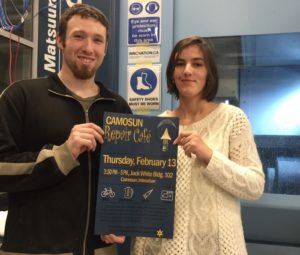Just because something can’t be used doesn’t mean it can’t be saved. It just means it hasn’t yet seen the hands of first-year University Transfer student Savannah Barratt. Barratt is part of the Camosun Innovates Innovators Club. The club will be hosting an upcoming repair café, where students and staff can bring their broken goods to be fixed or reused.
Barratt—a former youth in care who was part of the BC government’s Provincial Tuition Waiver Program—knows the value of social innovation. With the repair cafe, she hopes to combat what she calls our “throwaway culture.”
“It’s also got large roots in social endeavours,” she says. “So kind of thinking about, ‘Something is broken. It’s not working in a society, so you figure out a way to fix it.’”

But many people today have lost the skills needed to fix things themselves, because it’s been a while since we needed to fix things ourselves.
“We get something; it breaks. We throw it away instead of fixing it,” says Barratt.
So, being at Camosun—an institution with many students in trades, business, or technology programs—Barratt wanted to try to put a stop to that. Throwaway culture’s impact on the environment is, after all, devastating.
“It’s bringing together a whole bunch of resources that we have and changing a social problem,” she says, “even if it’s just for a day.”
But there are limits on what this repair café can fix. Barratt says that if you can carry it in your arms, you can bring it in. Think about that small appliance that you love, but isn’t quite working anymore. Think about small electronics, she says, or that wooden bird with the broken wing that you don’t know how to fix.
“A shirt you love, but you have no idea how to darn a hole,” she says. “You’d throw it away if someone didn’t know how to fix it for you, and that’s where we come in.”
It’s resource demand, she says. When you don’t need to do it anymore, you don’t spend the valuable resource of time; no one teaches you how to do it because they weren’t taught.
“It’s faded out of our society a bit, and that has had counter-effects, kind of cascading effects… and one of those things is producing a lot of waste,” she says, “because we can just buy another one.”
It seems like a small problem, but it’s not, says Barratt. Waste adds up. But an important point to raise, says Barratt, is that some things aren’t built to last the way they used to be.
“Part of this repair café, and repair cafés in general, is, yes, fixing things, yes, talking about the problem of consumer waste, but also the idea of thinking about the components of things, and why they work the way they do,” she says. “Kind of the knowledge transfer of people who know things and know how they work, and people who think, ‘This only does one thing.’”
The repair café is happening on Thursday, February 13 from 3:30 until 5 pm in Jack White 102 at the Interurban campus.

Hi Adam,
I just wanted to offer to volunteer at the next Repair Cafe. I have a portable repair stand and tools.
Perhaps you could pass along my details to Savannah Barratt, or others in the Innovators club.
I am an employee with the Heavy mechanical dept, I would be able to help out with Bicycle repair.
regards, Dave Lacey.